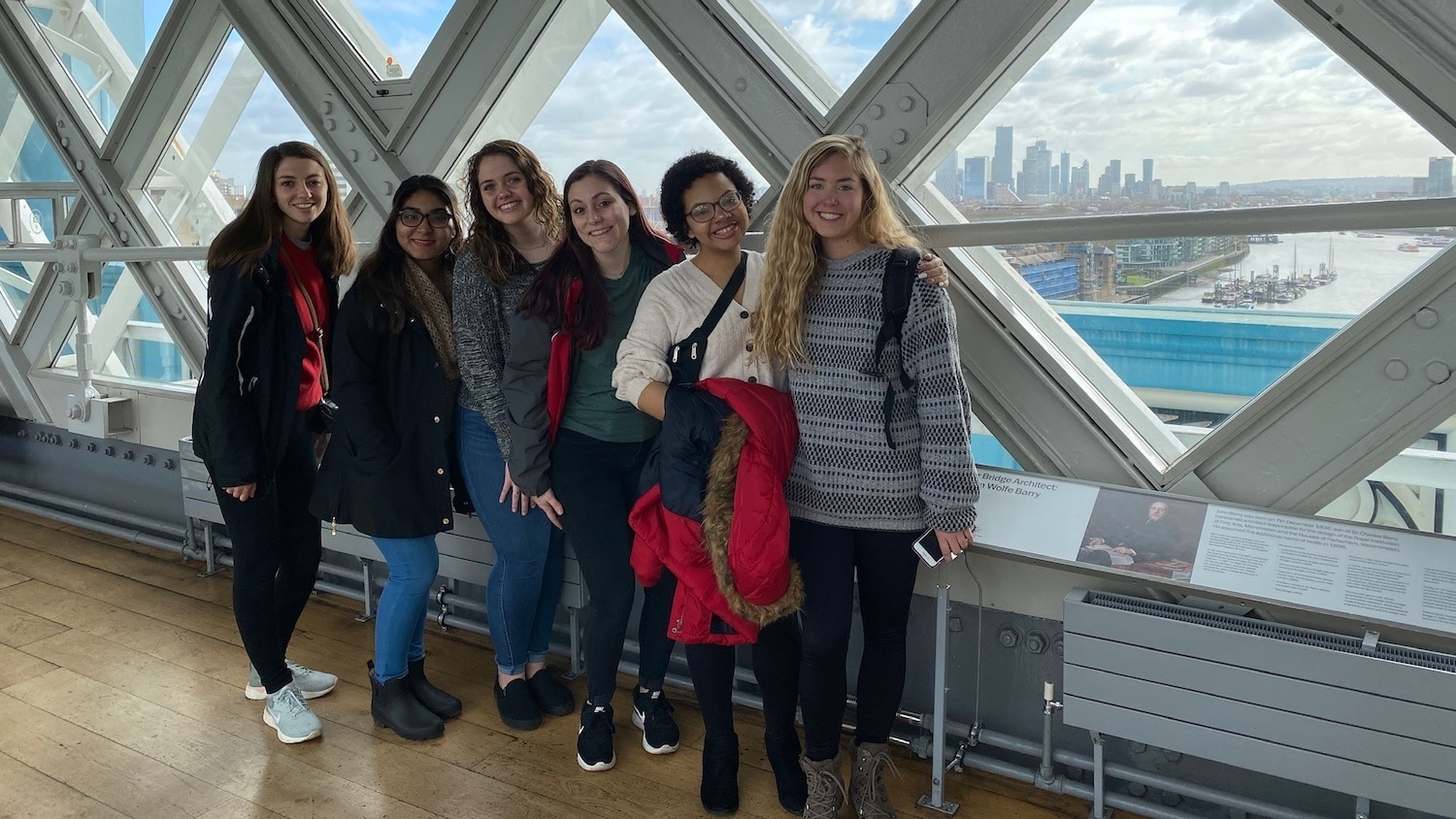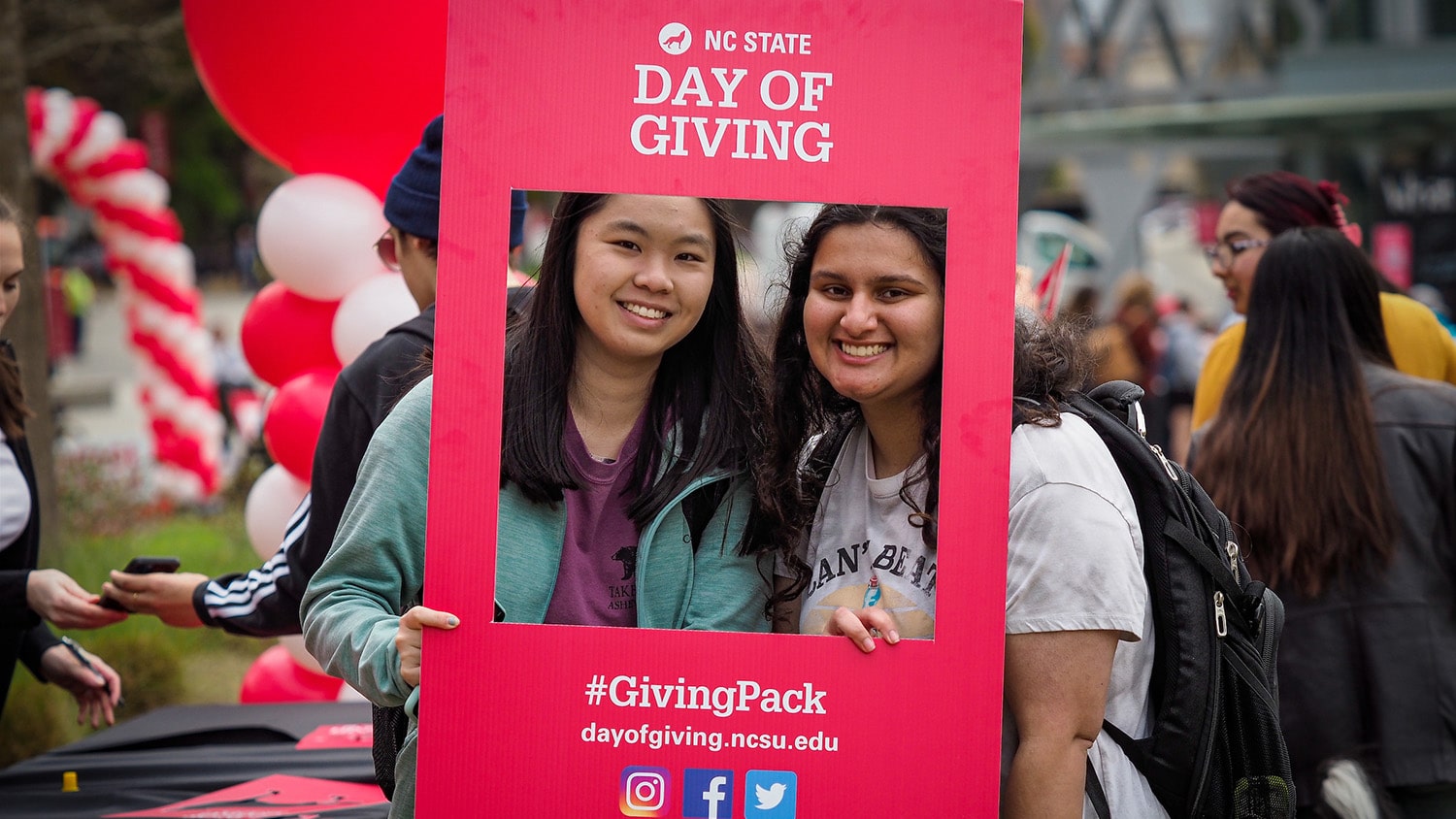Kalynn Turner, a chemistry major in the College of Sciences, hails from a small, rural town in western North Carolina. Attending a university as large and diverse as NC State could have overwhelmed this first-generation college student, but the Chancellor’s Leadership Development Program (CLDP) was there to help her navigate campus life during her freshman and sophomore years.
“Thanks to CLDP, I was automatically connected with a group of students with similar experiences to me,” Turner said. “Although we all had different backgrounds, the common thread of being first-gen students from rural parts of North Carolina brought us so close together.”
CLDP gave Turner a home away from home — and a family away from family — during her first two years in the Pack. Now, with the approval of Chancellor Randy Woodson and Provost Warwick Arden, the philanthropy-supported program is helping her and her fellow CLDP members during their junior years too.
How It Works
CLDP is part of the Shelton Leadership Center (SLC), NC State’s universitywide effort to produce well-rounded, ethical leaders. CLDP was founded in 2017 in order to double down on that mission by specifically training first-generation students and students from rural counties within North Carolina to be values-based leaders in their respective fields upon graduation.
Students apply for the program before beginning their collegiate careers. Some 20 to 25 students are then selected each fall, attending and participating in various CLDP opportunities each week during the school year.
First-year CLDP students start off with a number of activities designed to maximize their leadership skills through experiential learning and self-discovery. These include monthly group-mentoring meetings with members of NC State’s faculty/staff, monthly advising sessions with SLC staff, seminars, SLC programs, events with Woodson and his wife, Susan, at their Centennial Campus residence and a fall retreat, among others.

Second-year CLDP students continue to attend forums and speaker series as well as participate in a year-long service partnership (for example, in 2019-20 CLDP partnered with Inter-Faith Food Shuttle), a spring break study-abroad trip and other activities. The students also develop collaborative research projects during their second year, the findings of which they present to the Woodsons, the staff of the Shelton Leadership Center and its supporters, board members and donors.
Second-year students take part in leadership exercises as well. Each rising sophomore is given a leadership role within CLDP to assist with programmatic responsibilities and expectations. These year-long roles may include managing social media accounts, coordinating peer-mentor pairings and assisting with the logistics involved with the various seminars and retreats CLDP hosts.
How It’s Expanding
Beginning this fall, CLDP is also open to juniors.
The recently approved expansion of the program allowing third-year students to match with a professional mentor in order to complete an internship or an independent study for credit. CLDP juniors can also continue taking part in leadership roles within the program.
Other facets of CLDP’s third year include an international study-abroad trip with financial support from SLC or financial support for an internship, alternative break program or other study-abroad program through NC State.
“I was very excited to continue on into the optional third year of the program,” Turner said. “Being in this third year has given me more of an insight into how to apply the leadership principles that have been instilled in me over the last two years. I am excited to see how much I grow as a leader and as an individual over the course of the next year.”
Thus far, the program has been very helpful to me as a first-generation student, and I know that continuing in the program will only help me even more. — Emily Medina ’24
Emily Medina can look forward to three years of CLDP participation right from the start of her time at NC State. A freshman majoring in criminology, Medina is already enjoying her time in the program despite the effects of COVID-19 on every aspect of college life.
“As a first-year student, I think that joining the Chancellor’s Leadership Development Program has already proven that it will be of great benefit to me. Despite our inability to meet in person, I feel as though I have already formed some great relationships with my fellow members, whether it be through our weekly seminars, mentor meetings or our social events, which all take place on Zoom.
“I find the program extension to be a wonderful opportunity,” Medina added. “Thus far, the program has been very helpful to me as a first-generation student, and I know that continuing in the program will only help me even more.”
How It’s Supported
CLDP’s parent program, SLC, is named in honor of Ret. Gen. H. Hugh Shelton, former chairman of the Joint Chiefs of Staff under Presidents Bill Clinton and George W. Bush. As an NC State alumnus (’63, textile technology) and a native of Tarboro, Shelton knows full well how important leadership training is for first-generation students and students from rural areas of North Carolina.
“[W]hen it came time to decide where I wanted to put my money, this was an obvious choice. Of course, I did it in Carolyn’s honor because she’s worked hand-in-glove with me over the years, and she’s worked on this program from day one. — Gen. Shelton
“You get one-on-one, individual mentoring, if you will, and teaching and coaching in a program like the Shelton Leadership Center or the Chancellor’s Leadership Development Program,” Shelton said. “That is extremely important, otherwise these students … might become discouraged and then go back home, and a tremendous amount of talent is lost because we didn’t have a program set up to help them or to put them on the same level that students coming from other areas might have.”
Shelton and his wife, Carolyn, have financially contributed to SLC and CLDP since the early days of each program. Shelton even created a CLDP endowment fund in Carolyn’s honor — the Carolyn Shelton Leadership Scholarship Endowment.
“When you can focus the money into a program like this, which has such a high rate of return on the dollars you put in going directly to the students who need it, to make the program work, that’s a great place to invest,” Shelton said. “So, when it came time to decide where I wanted to put my money, this was an obvious choice. Of course, I did it in Carolyn’s honor because she’s worked hand-in-glove with me over the years, and she’s worked on this program from day one. She’s passionate about it.”

James Owens, another CLDP supporter, saw the importance of values-based leadership during his time as the chairman and CEO of Caterpillar Inc. The native of Elizabeth City and former chair of NC State’s Board of Trustees earned his bachelor’s, master’s and Ph.D. from NC State in 1968, 1970 and 1973, respectively. Now, he gives to CLDP so that future NC State grads can learn to lead responsibly.
“I think servant-based leadership, you’re not putting yourself first. You’re generally putting the team first and being very inclusive with your leadership expectations,” Owens said. “You need strong leaders, but not leaders who bully others into doing what you want them to do. Leaders who are engaging people, who understand the goals and objectives, who voluntarily put their best efforts into it, who bring their best ideas, who feel comfortable challenging the leader to be better.”
Owens and Shelton have both been pleased with the results of their investments thus far. And giving to CLDP is an investment. The program is helping train tomorrow’s leaders today, the benefits of which will be reaped for years to come.
“Every time … I have the opportunity to talk to the students, it is evident that the program is working and that NC State is cranking out some really great students who have the right ethical and moral background,” Shelton said of CLDP. “We start with a good product, but … we send out a great product.”
“I can say that if it weren’t for CLDP, I would not be as confident to look for new opportunities,” Turner said. “The program has pushed me to become the best version of myself and to grow outside of the scope of academics, and I am really grateful for that.”
This post was originally published in Giving News.
- Categories:



